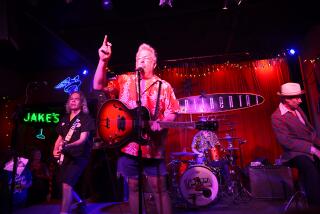Nixon as a Chicago Bear : WHATEVER HAPPENED TO GLOOMY GUS OF THE CHICAGO BEARS? <i> by Robert Coover(The Linden Press: $16.95; 120 pp.) </i>
- Share via
When the subject is urban grotesquerie, the kind that boils the blood of news hounds and sends more sensitive souls scrambling for cover, no American city comes within a mass murder of Chicago.
The Specks and Gacys stack their victims like cordwood, while El trains plummet from their tracks, linebackers dream of decapitating quarterbacks, and boodling politicians declare that their fair city ain’t ready for reform--at least until they get theirs.
But, even in Chicago, enough eventually becomes enough, which should explain why it was never Richard Milhous Nixon’s kind of town.
And yet Richard J. Daley’s old stronghold is precisely where author Robert Coover deposits Nixon in this curious novella. The deposed and disgraced former President is disguised as a broken-down football player “with his marble shook loose.” He wears a beard, spouts lines from plays that he has memorized in his new calling as an actor and beds women with the fervor of a Warren Beatty or--better warn the Republican National Committee--Gary Hart. But, despite Coover’s refusal to identify him as anything but Gus or Dick, it’s Nixon, all right.
“He was very skillful . . . but he was a man without an overview,” says Coover’s narrator, a socialist sculptor named Meyer. “He lived this rigid, segmented, repetitive life, and he couldn’t step back. His inability to discriminate was phenomenal. He was a freak, all willpower, no judgment. . . .”
And when he was a lad, his mother checked his breath before he went out on dates.
Perverse? Obviously. But that isn’t the half of it. When we are introduced to Gloomy Gus, he is already dead, the 11th victim of police bullets in the Republic Steel slaughter of 1937. In truth, only seven men went to their graves after that typically messy chapter in Chicago history, but Gus had been a star halfback for the Bears, so Coover chose poetry over accuracy.
Whatever, Gus is dead and his story is being told by Meyer, a self-described “lyrical socialist” who never could quite understand Gus’ presence in the midst of union activists and budding Lincoln Brigaders. The mystery was simple enough: Meyer’s friends were ready to march off for the first cause that grabbed them--the war against Franco in Spain topped most lists--while Gus, despite his Karl Marx countenance, had the social conscience of a municipal statue.
“Gus not only lacked political awareness, he lacked awareness of any kind,” Meyer says. “He had no core at all. Unless pure willpower has some kind of substance, amounts to some kind of character.”
Nevertheless, Meyer found himself drawn to this strange, haunted cipher. Never mind that they were so different on the surface, that Meyer couldn’t pull the trigger regarding any of the important issues in his life, while Gus was forever charging offsides in both football and sex.
“I’m afraid we had a lot in common . . . more than I’ve sometimes wished to admit,” Meyer says. “I’ve said we simplified ourselves--but didn’t we merely substitute a vertical madness for a horizontal one?”
In his case, Meyer can’t make the commitment to fight in Spain, can’t answer his friend’s pleas to “be a Jew”; he has let himself become obsessed with the statue of Gorky he is making with scrap metal. On the other hand, obsession was the only way Gus ever got ahead; it turned him from a bookworm and Mama’s boy into the inspiration for the song “You’ve Got to Be a Football Hero.” But the higher he rose, the narrower his focus became. And ultimately it turned into the sword on which he was impaled.
Gus should have seen it coming, of course. The warnings were strewn throughout his life. But they remained a mystery to him, even as he lay dying. “Chief,” he asked Meyer, “why is it we go on forever, making the first mistake we ever made . . . over and over again?”
Perhaps it is because of shortsightedness, tunnel vision, a refusal to give history its due--the very failings that Coover lays on Gus.
Surely, no one can accuse Coover of ignoring history, for this is the second book in which he has jabbed Nixon’s ghost with his pen. “The Public Burning” was the first and, alas, the better, for it was richer, deeper, more thoughtful. Neither, to my mind, touches the beguiling quirkiness of Coover’s “The Universal Baseball Association, J. Henry Waugh, Prop.,” but that’s another story.
This one, the one about poor Gloomy Gus, left me wondering why it was ever written. That is not to quibble about the artistry--Coover couldn’t write a dull note to the milkman--but it is to kvetch about his preachiness and his refusal to till new soil.
We know about Richard Nixon; indeed, we reached the saturation point with him more than a decade ago. And, if we really needed to beat that dead horse any more, it would not be by reading a novella that bears a novel’s price tag and smacks of being no more than an inflated short story.
But an inflated short story is what Coover has handed us. To give him the best of it, one must assume that the tale of Gloomy Gus was burning inside him and that the only way he could put out the fire was by going public with it.
By indulging himself, however, Coover has undercut the very lesson his book was supposed to teach. He has paid attention to history, but he has repeated it--and himself--anyway.
More to Read
Sign up for our Book Club newsletter
Get the latest news, events and more from the Los Angeles Times Book Club, and help us get L.A. reading and talking.
You may occasionally receive promotional content from the Los Angeles Times.







